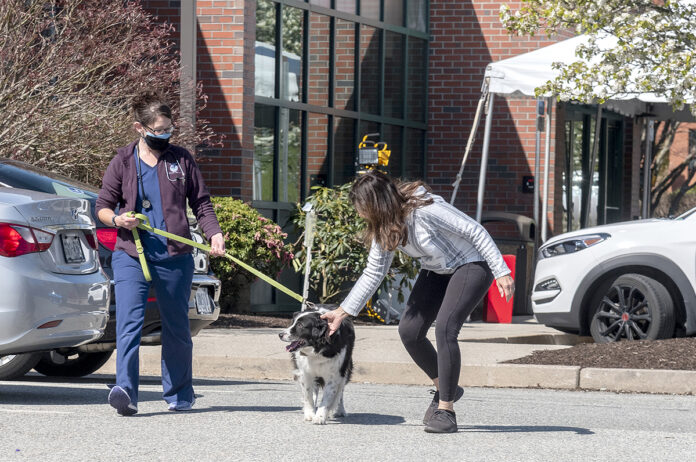Veterinarians are worried about the new coronavirus, too. Every potential contact with the owner of a patient – in this case a dog, cat, bird or reptile – carries a risk.
So, to keep themselves, their staff and their clients safe, many vets in Rhode Island have adopted new procedures for seeing patients.
Although vets are considered an essential service, and not restricted by state government as other businesses have been in the COVID-19 pandemic, many have closed for all but emergency visits, or have reduced their hours.
Others are still seeing pets, but their system of contact has changed.
At Ocean State Veterinary Specialists Ltd. in East Greenwich, one of the larger practices in Rhode Island, pet owners are now asked to stay in their cars. The pet is walked in by a technician, who takes the relevant information from the owner at a safe distance.
All the time, the veterinarian and the technician will be wearing masks, and if necessary, gowns and gloves if the pet belongs to someone who is in quarantine or who has COVID-19. In those cases, someone else has to bring the pet to the appointment.
It’s a new way of doing business, but it’s necessary, said Dr. Gary Block, a veterinarian who co-owns Ocean State Veterinary Specialists with his wife, who is also a vet
‘I really like to see my clients. I am missing that body language.’
DR. CATHERINE LUND, City Kitty Veterinary Care for Cats Inc.
“Most if not all the vets that I’m aware of in Rhode Island have gone to this kind of curbside approach,” Block said. A lot of the conversation between owner and vet is done over the phone. After the exam, he said, “I call the owner up with my physical exam findings and we combine that information with the owner’s concerns, and then we map out a treatment plan.”
It’s far less efficient. “Normally, when I’m seeing a patient, I’ll be talking to the owner, doing my exam, doing all of that in the exam room as kind of a continuous stream of consciousness kind of thing,” Block said.
But what pet appointments are necessary and which ones aren’t? It’s an issue many veterinarians are grappling with, he said.
“For example, is vaccinating a puppy, who is going to be at risk for parvovirus, or rabies, an essential service?” Block said. “I think many people would say yes. An older dog, whose had vaccines, is probably protected and not going to get into trouble by being late a couple of months on a vaccine.”
At City Kitty Veterinary Care for Cats Inc., the procedures are similar.
At the Providence-based practice, cat owners can either place the carrier outside of their car, or put it on the front stoop. Conversations about exams take place over cellphone or at a safe distance outside, said Dr. Catherine Lund, the veterinarian and business owner.
Lund finds the whole thing awkward and uncomfortable and is eager to return to in-person appointments. Conversations about difficult medical issues feel impersonal over the phone, she said.
“I really like to see my clients. I am missing that body language,” Lund said. “It is really, really hard to tell someone their cat has a terminal disease.”
Lund said she’s concerned about her employees, too, some of whom are anxious about the infectious virus. It’s been a challenge to try to work with people who really don’t want to come into the office out of fear. She said she’s been able to work around for now, by providing people with full insurance and having them use sick time.
“It’s kind of surreal and weird,” she said. “But we have an obligation to keep our staff and our clients as safe as possible.”
At Ocean State Veterinary Specialists, Block has made some exceptions, allowing certain clients in while maintaining social-distancing requirements.
Owners are allowed in the building if their pet has to be euthanized. The veterinarian administers the drugs from a safe distance, using an extended tube.
The continuing uncertainties around testing and infection have brought forward many concerns for practicing vets, said Block, who is a past president of the Rhode Island Veterinary Medical Association.
Pet owners making appointments are now asked if they have contracted COVID-19, or if they’ve had symptoms, or if they have had exposure to someone with the disease.
If the pet is coming from a home in which an infection has happened, the protocol changes, but that doesn’t mean the client is refused. The animal will be handled more carefully, with the vet and staff fully protected in gowns, and the pet will be wiped down with alcohol, which kills the virus, Block said.
Other concerns are also worrisome.
If an owner who doesn’t know they have the virus sneezes at home, then touches their hand, then pets their dog or cat, and a few hours later, the animal is brought into a visit “and I pet that dog, and then touch my nose or mouth,” there is a potential for infection, Block said.
So far, none of the employees at the 250-employee practice have contracted COVID-19, Block said.
But he said he understands why many veterinarians have reduced appointment windows.
“They’ve elected to decrease their staff’s exposure to people, either by introducing some of these protocols, or by closing, or by reducing hours, or only seeing emergencies, which is reasonable,” he said.
Mary MacDonald is a PBN staff writer. Contact her at Macdonald@PBN.com.












